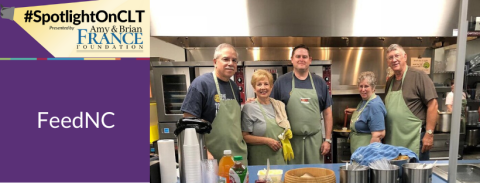#SpotlightOnCLT: FeedNC
Written by Sarah Fligel
During a normal time, FeedNC serves 700 families in the Iredell County region and receives about 10 new food pantry applications a week. Then came COVID-19. Now, the organization has added close to 50 families in just two weeks and has received 10 to 15 calls a day about its pantry, says Executive Director Lara Ingram.
“This is a demand we’re not used to meeting,” she says. And that demand is coming from beyond the borders of Iredell County. “We’re getting calls from all over,” Ingram says, “and we’re having to decide if it makes sense for families to come all the way to Mooresville.” A lot of the staff’s manpower right now is being used to talk to these new families, reach out to social workers and find the best, closest resources to help.
FeedNC – which stands for Food, Education, Essentials, Dignity – is a nonprofit food-focused organization that seeks to end the cycle of hunger and poverty with extensive programs and opportunities for those in need. Since its inception in 1987, FeedNC has expanded its services to include regional markets, a food pantry and workforce education. In addition to the thousands of lives it has impacted, the group serves more than 100,000 meals annually and delivers more than 125,000 pounds of food a month.
Normally, food supply is not an issue for FeedNC. The organization receives food weekly from Second Harvest Food Bank of Metrolina as well as area grocery and big box stores. But with the COVID-19 crisis and the public’s increased demand for groceries, FeedNC’s food supply has been cut in half, Ingram says. And the demand continues to increase.
These challenges aren’t stopping FeedNC from doing its valuable work. “We want people to know we’re open, and we’re working really hard,” Ingram says. “We continue to operate five days a week and intend to do so as long as we have food to distribute to those in need.”
Meeting this challenge with COVID-19’s restrictions has required significant adjustments. FeedNC now stocks coolers outside the building Monday through Friday that provide sandwiches, prepackaged salads and deli items for people in need to come and take. On Wednesdays, registered families receive an allotted time slot and drive up to receive a box of groceries filled with $100 worth of items such as meats, four frozen home-cooked, nutritious meals, canned goods and fresh produce. On March 25, 200 cars came through, Ingram says, which translates into over 600 people fed. FeedNC has added an emergency pantry service on Friday from 10 AM to 12 PM for those who aren’t yet served through the weekly program. About 200 cars showed up the first Friday it was offered as well, Ingram adds. Families in need are asked to fill out an application from the FeedNC website. Approval can be done in a day’s time, ensuring access for the week.
In addition to the coolers and pantry services, FeedNC is continuing to deliver food weekly to 50 shut-in families through its Food Movers program. Food is left at a family’s door, and volunteers call to make them aware of the delivery. It’s an invaluable service for families who have become even more isolated since COVID-19. Recently, one volunteer delivered a box but received no answer when calling repeatedly. FeedNC’s program director and the police did a wellness check and discovered the resident had taken a fall and was unable to get up. “That is really the point of the Food Movers program,” Ingram says. “You have someone to check on you once a week.”
Another bright spot during this difficult time is the volunteers. While many regular volunteers are in the age range that puts them at higher risk and can’t come in, FeedNC has counted new volunteers that typically aren’t available. Many people from the restaurant industry – including some notable area chefs – have helped to cook meals. There are still 250 meals a day being cooked and then frozen for the grocery boxes or other needs. “We’ve had a lot of restaurant workers call and tell us, ‘I’m not working, and I want to help,’” Ingram says. “And they’ve filled our kitchen. … We’ve had some amazing stories of really good people.”
FeedNC also offers a 12-week culinary job training program that provides hands on culinary education, job skills coaching and job placement to its diverse students. While this will have to be put on hold, the current program is continuing to allow two students to graduate in April.
FeedNC faces a tremendous need for financial assistance and in-kind donations, as the number of those struggling to provide healthy food for their families continues to grow. Here are ways to help:
-
Donate financially to FeedNC, online at www.feednc.org or by mail at FeedNC, PO Box 5173, Mooresville, NC 28117.
-
Purchase needed items to come directly to FeedNC from their Amazon wish list
-
Email jrizzo@feednc.org or call 980.226.0448 if you have a company, foundation, church or community organization that is able to help. Cook teams are especially needed. (Social distancing and other preventive measures are being observed onsite.)
Of the 700-plus families FeedNC serves, almost all had been employed, Ingram says. Many were working several jobs to make ends meet. But now, more and more have found themselves out of work and questioning how they will provide for their families. “The demand is more the uncertainty,” says Ingram. “This has just been going on for a few weeks. The biggest concern is the months to come. It’s about the fact that people believe this is going to go on for a few months or more.”
Thank you to the Amy and Brian France Foundation for presenting this year's #SpotlightOnCLT content series!




